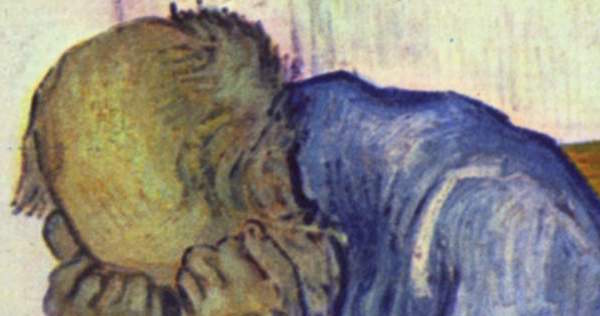
Let us imagine a feast. And let us imagine someone too mentally ill to eat. Imagine someone who thinks the food is contaminated or poisoned and refuses every plate. Or someone who will only eat food of a certain colour. Or someone who thinks him or her self a wild animal and who won’t eat food prepared by humans. Though they are exaggerated figures and not realistically complex, they do represent the way mental illnesses can screw up our minds and keep us from basic human needs, such as eating.
Now, imagine what would happen if we, in caring for these people, insisted that they need be healed and in their right mind first before we try to help them eat. Imagine what would happen if we didn’t for the sake of their survival accommodate their conditions and try to get them sustenance by whatever means possible, whether by IV or by working with their delusions. The answer is that these people would probably starve well before we could help them mentally. And prior to that, their mental conditions would simply be worsened by their lack of food. Even if those waiting for the cure before helping them eat were well meaning, the result would be tragic.
Now, imagine a different kind of food. “Give us this day our daily bread,” we say in the Pater Noster, and we know when we say this that we don’t simply mean physical bread but also spiritual, the sustenance meant by Christ at his temptation when he reminded the devil that we “do not live by bread alone, but by every word that comes from the mouth of God.” As spiritual beings, we have in us a religious correlative to our physical hunger, a hunger and thirst for God. And I can’t help believing that, when we don’t listen to this hunger, we begin to starve spiritually.
I make this observation because it seems to me of the utmost importance to recognize two things in matters of faith and mental illness: that there is a basic human hunger for God independent of our mental illnesses, and that there is such a thing as mental illness independent of our basic human hunger for God. I have seen problems when people conflate our illnesses and hungers.
On the one hand, those convinced that this hunger for God is mere neurosis are limited in what they can do because they are simply failing to acknowledge a basic fact of reality, what Luigi Giussani calls “the religious sense” and the things this sense points to. Functional atheism has had a brave and wonderful run – heroic really – but in the long scope of history it is difficult to find any kind of societal sustainability without some kind of religious sense, and until atheism has shown an ability equal to religion in renewing the sustainability of the human enterprise – and that for thousands of years – I will be wary of accepting it as a given, particularly in areas where human lives and therefore precisely the sustainability of humanity is at stake. Implicitly telling patients that their spiritual hunger is neurosis when a significant portion of wise persons throughout history have devoted their lives to the study of that hunger suggests a problem – if the modern doctor is in the historical minority in this, one suspects that traditions discussing our spiritual hungers might have more suitable things to say about the doctor than the doctor about them.
But, on the other hand, there are those who want to suggest that mental illness is merely an emanation of this hunger, and that in a way other than most illnesses. There is of course one sense in which all sickness and illness is (somehow if often very mysteriously) the result of sin and of our lack of the God we need. But there is also the fact that there is no necessary correlation between Christ’s answer to our spiritual needs and the fact of being healed. Simply “finding God” will not de facto heal our broken legs or our diabetes or our depression or bipolar disorder or schizophrenia or obsessive compulsive disorder precisely because God cannot be reduced to a mere cure – even as physical cures do not always constitute spiritual healing. Christ lays it out for us in the healing of the paralytic, telling him first, “your sins are forgiven,” and next, “get up and walk.” The important point to take away from this is that neither phrase is dependent on the other – miracles can happen to the sinner in his or her sins, for “God sends rain on the righteous and unrighteous” (Matthew 5:48) – and forgiveness of sins can come to those whose broken bodies remain broken. In this instance, of course, we see the two combined, the foreshadow of the eschaton when the two become one. But prior we can make no assumptions. Finding Jesus is not the same as finding a cure for mental illness. And finding a cure is not the same as finding Jesus. But we must never give up on either task, working with the manifold workings of the Spirit to discern and follow the figure of Christ in all – in sacrament, liturgy, creation, other persons, etc. – and working with the doctor as outlined so beautifully in Sirach 38.
To bring it all back to the opening image, I am proposing mental illness and spiritual hunger as two things working alongside each other. Yes, they become entangled, and seemingly in inextricable ways – please don’t misunderstand and think I am suggesting that it is at all easy to determine what is mental illness and what is real spiritual hunger in the tangle, or that mental illness doesn’t commonly appropriate the guise of particular kinds of spirituality. Spiritualization of mental illness is indeed a huge problem – indeed as huge a problem as the neuroticization of spiritual hunger. But to focus on one at the expense of the other will be as damaging as deciding there must be a false dichotomy between feeding those in the opening parable and working to cure their mental illness.
Of course, as in this parable, helping to spiritually feed those of us who suffer mental illness will require a certain amount of creativity and flexibility, a willingness to find meaningful “workarounds” for the aspects of faith that our illnesses appropriate. I think I’ve intuitively incorporated so many of these already into my life with OCD and depression that I’ve probably lost track of what “normal” spirituality is or should look like, but I do know it means avoidance of a particular kind of experientialism popular among Evangelical Christians. I can also think of examples I’ve seen elsewhere. In her excellent recent post giving an insider’s perspective on the experience of scrupulosity, Rhonda Ortiz talks about how for a long time she had to avoid reading The Imitation of Christ by Thomas à Kempis because it triggered her scruples. And though not designed only for those with illnesses, Patheos Catholic’s Sick Pilgrim is a site broadly oriented toward those for whom “mainstream” spirituality has not worked, but who nonetheless desire such workarounds through which they can still be in love with God.
So, when all is said and done, how do you help your friend?
Remember that no matter how twisted our minds, we are still spiritual beings with needs and hungers for God. And also remember that God in feeding us himself does not obliterate us – there is still an us in all our frailty and twistedness and psychological brokenness, an us that is a body and has medical needs. The Eucharist is not a replacement for Prozac or therapy or basic bodily care, and it is possible – perhaps probable even in many cases – that Christ will say, “Your sins are forgiven” but will not follow it up with “Rise and walk.” And in these cases, look at us so broken and forgiven and loved all at once and know us as a prophecy yearning for the eschaton when the fire and rose of forgiveness and healing are one, for in our bodies we bear the shape of the world in time – a brokenness clinging to promise.











